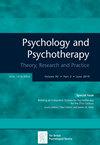“What I share is not the same as therapy”: Psychologist experiences of Instagram use as a mental health influencer
Abstract
Introduction
Psychologists are increasingly using social media to share their therapeutic knowledge. Despite this, social media guidelines devised by professional bodies remain limited in content, with the focus typically on personal use rather than professional use as a mental health influencer. Therefore, this study aimed to explore practitioner psychologists' experiences of Instagram use with an influencer presence.
Methods
Twelve UK-based practitioner psychologists were interviewed who had an Instagram account that they used as a mental health influencer. The semi-structured interview transcripts were analysed using reflexive thematic analysis.
Results
Three themes were developed, each with four subthemes. The first theme ‘“I'm a psychologist, but I'm not your psychologist” explored psychologists’ experiences of trying to input boundaries on Instagram around self-disclosure, risk management, time management, and client work. The second theme ‘“anxiety about not wanting to do the wrong thing” highlighted the impact of an influencer presence on psychologists’ own mental health. The third theme ‘“I share what I think is going to be helpful for other people and myself” considered the psychologists’ motivations for Instagram use for social justice advocacy and business promotion, and the contradictions between these.
Conclusion
Psychologists can use their training to share evidence-based research as a free widely accessible form of psychoeducation potentially acting as a first step into therapy. However, there are still many ethical ambiguities thus updated guidance specifically for an influencer presence can reduce psychologists' anxieties and potential risks.





 求助内容:
求助内容: 应助结果提醒方式:
应助结果提醒方式:


